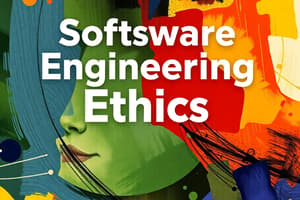Podcast
Questions and Answers
What is a DPIA?
What is a DPIA?
- A tool to transfer or receive data from overseas
- A legal requirement for all data processing activities
- A document that needs to be sent to the ICO for every processing operation
- A way to identify and minimize data protection risks (correct)
What should you do if your DPIA identifies a high risk that cannot be reduced?
What should you do if your DPIA identifies a high risk that cannot be reduced?
- Send a copy of the DPIA to the data subjects
- Ignore the risk and continue with the processing activity
- Consult with the ICO (correct)
- Embed the DPIA into your organizational processes
Flashcards
DPIA definition
DPIA definition
A process for identifying and minimizing data protection risks.
High risk in DPIA
High risk in DPIA
If a DPIA finds a high risk that can't be lowered, consult the ICO.
Study Notes
security updates and patches in a timely manner. Additionally, computing professionals should design systems that are usable and accessible, recognizing that secure systems that are difficult to use may lead to circumvention of security measures. They should also educate users about safe computing practices and appropriate use of security measures. In situations where trade-offs must be made between security and other factors such as usability, computing professionals should carefully consider the risks and make informed decisions with the goal of minimizing harm.This text outlines the ACM Code of Ethics and Professional Conduct, which provides guidelines for computing professionals to ensure that their work is socially responsible and of high quality. The Code is organized into four main sections: General Ethical Principles, Professional Responsibilities, Mitigating Harm, and Professional Leadership Principles.
The General Ethical Principles section includes principles such as promoting the public good, avoiding harm, and being honest and trustworthy.
The Professional Responsibilities section outlines responsibilities such as maintaining competence, respecting privacy, and avoiding discrimination.
The Mitigating Harm section discusses techniques for reducing harm, such as monitoring, patching, and vulnerability reporting, as well as the importance of notifying affected parties in the event of a data breach.
The Professional Leadership Principles section highlights the responsibilities of leaders in promoting social responsibility, supporting professional development, and being good stewards of systems that become integrated into society.
Finally, the Code emphasizes the importance of upholding and promoting its principles, treating violations as inconsistent with membership in the ACM, and reporting violations to the ACM. The Code was developed by the ACM Code 2018 Task Force and adopted by the ACM Council in June 2018.
Studying That Suits You
Use AI to generate personalized quizzes and flashcards to suit your learning preferences.




